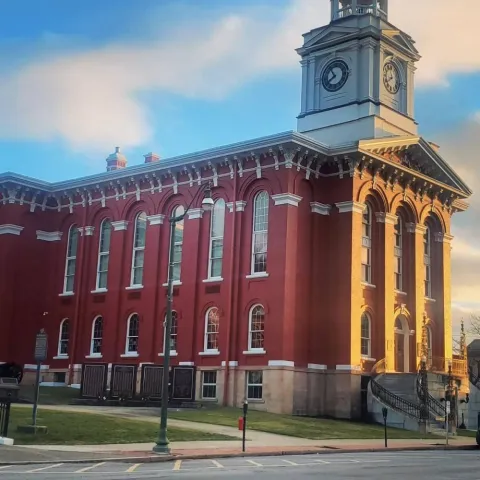Brookville
Brookville borough is a community rich in history. The first white settlement in the Brookville area dates from 1796 when brothers Joseph and Andrew Barnett and Samuel Scott arrived at the confluence of Sandy Lick and Mill Creeks in the Port Barnett area about one mile east of the present downtown. Eight years later, in 1804, Jefferson County was established from sections of Lycoming, Huntingdon, and Somerset Counties. In 1830, the town of Brookville was laid out and was designated the county seat, and a property sale was held; individual lots were bought for $30 to $300. As was the custom, specific lots were reserved for public buildings and a burial ground. Moses Knapp came to Brookville with the Barnetts and Scott in 1796 and helped them build the first sawmill in Port Barnett. In 1797, Moses Knapp left the group and built his sawmill by North Fork at Cook Mill Pond; he was the first settler in what is now called Brookville. Moses later sold his mill and settlement and built a new home and mill near the location of Christ Brewery at the mouth of North Fork. Moses died in 1852 at the age of 74.
By 1832, just two years after the first town lots were sold, there were forty dwellings, a brick courthouse, four stores, and four taverns. In 1840, the population was 276, but much of the town was still in the wilderness when the Brookville Academy was built at the corner of Jefferson and Barnett Streets. Many of the newcomers to Brookville came because of the prosperous lumber industry. Area raftsmen constructed large rafts of timber or sawn boards and, in the spring and fall, were busy plying the waters between the still small town and the lumber markets in Pittsburgh.
By the late 1800's, the combination of railroads and the industrial revolution had brought the town to full flower. This fact is restated by the classic downtown commercial architecture and the glorious Victorian homes that dominate the residential districts. During the late 19th And early 20th centuries, Brookville had many diverse industries, most of which faded from the scene as new technologies developed. There was an ax factory that produced 250 axes per day, a ladder factory, two breweries, many hotels, furniture and glass factories, several livery stables, carriage manufacturers, a woolen mill, foundries, and the Twyford Motor Company, which operated around 1905 producing the world's first 4-wheel drive automobiles. While many other communities followed a similar evolutionary path over the past century and a half…Brookville's genius lies in its decision to nurture, protect, and celebrate its heritage.
Brookville is the kind of town that carefully considers its history. The people are committed to the proposition that the best qualities of the past should be reflected in the present…and preserved for the future. Brookville has gone to great lengths to preserve the charm and character of its rich Victorian past through its restoration and has been listed in the National Register of Historic Places since 1984. This community has won numerous awards for our efforts, including the Pennsylvania Outstanding Downtown Project Award and the Outstanding Pennsylvania Community of the Year award. It has been recognized as a role model in the area of historic preservation throughout the state of Pennsylvania.
